Life Alert vs. Medical Guardian: Full Comparison for 2024: Reviewed by Experts
Life Alert vs Medical Guardian: Key Takeaways
- Monthly costs vary from $50–$90 for Life Alert, and $29.95–$44.95 for Medical Guardian.
- Both companies offer 24/7 monitoring and both at-home and on-the-go devices.
- Our Reviews Team recommends Medical Guardian over Life Alert based on Medical Guardian’s lower prices and Life Alert’s lengthy contracts.
Trying to decide between Life Alert vs. Medical Guardian? They’re two of the most well-known medical alert systems on the market. But which is better? That depends on your individual needs.
In general, medical alert systems use a small base unit paired with a wireless help button (for at-home systems) or a mobile device (for on-the-go systems) to connect to a company’s 24/7 monitoring center using a landline or cellular network. When you press the device’s help button, you connect to the monitoring center, where trained operators dispatch emergency services if you need them.
Finding the right medical alert system for you can be difficult since there are so many companies to choose from, and many offer similar products. To help make it easier, we conducted in-depth research on Life Alert and Medical Guardian. Ultimately, our Reviews Team recommends Medical Guardian over Life Alert, but both companies have pros and cons. Keep reading for a comprehensive overview of Life Alert vs. Medical Guardian reviews to find the best product for your needs.
Why you can trust our expert review
Our Reviews Team spent more than 2,500 hours conducting in-depth research on medical alert systems. During our process, we:
- Engaged in ongoing independent research
- Consulted with licensed adult caregivers and doctors who specialize in caring for older adults
- Mystery shopped 13 medical alert system brands
- Surveyed medical alert system users
- Tested various medical alert systems
- Read hundreds of verified customer reviews from trusted third parties, such as Better Business Bureau (BBB) and Trustpilot
Read more about our medical alert system review methodology.
Why we chose to review Life Alert vs. Medical Guardian
To help you decide which medical alert system is best for you, we compared two well-known companies. We chose Medical Guardian for its premium features and Life Alert for its name recognition. To see how these brands stack up against each other, we gathered as much information as possible on their special features, the costs of medical alert systems, and customer experience.
Our Reviews Team surveyed 1,000 medical alert system users and found more than 82% of Medical Guardian users say they are happy with their medical alert system purchase, compared to 64% of Life Alert users.
If neither Life Alert nor Medical Guardian is a good fit, there are several other medical alert systems to consider. For example, in our list of the best medical alert systems, MobileHelp was our pick for “Best for No Extra Fees,” Bay Alarm Medical was “Best for the Price,” and LifeFone was “Best for Customer-Friendly Policies.”
Medical Guardian
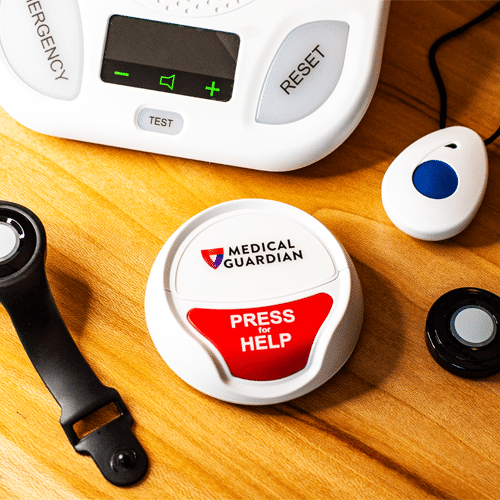
Pros
- Doesn’t require long-term contract and offers options for monthly, quarterly, and annual payments
- Free activation and installation with no hidden fees
- Fast response time (1–25 seconds)
- Long device range (1,400 feet)
- Refundable prepaid plans
- Offers promotional discounts occasionally
- Fall detection available for an additional $10 per month
- Offers Limitless Icons accessories that make your medical alert necklace look like jewelry
Cons
- Equipment purchases are required for some plans
- May require a restocking fee of up to $50 if you cancel the subscription
- Batteries need recharging every 1–5 days, depending on the device
Although Medical Guardian is less well known and younger than Life Alert (Medical Guardian was founded in 2005, and Life Alert in 1987), the company has established itself as one of the top medical alert system companies.
Medical Guardian offers five different devices, including one smartwatch option, and the ability to add fall detection (for an extra cost) to four of its five products.
Its five main options include the following:
- Two at-home models:
- MGHome Cellular
- MGClassic
- Three on-the-go models:
- MGMove
- MGMini Lite
- MGMini
To assist users in finding the plan and device that is right for them, Medical Guardian has a product quiz on its website to help narrow down the available options.
Unlike Life Alert, Medical Guardian requires no contracts, so you can cancel anytime. Medical Guardian also has one of the fastest response times in the industry—our Reviews Team tested Medical Guardian devices and found an average response time of 1–25 seconds, well below the 30-second industry average based on our internal testing.
It also has one of the longest device ranges in the industry at 1,400 feet (almost four football fields), compared to Life Alert’s maximum of 800 feet. Device ranges specify how close you need to be to the base unit (for at-home systems) for your medical alert device to work.
Medical Guardian also offers more special features than Life Alert, including the following:
- Smartwatch device (with optional fall detection)
- Location tracking (meaning caregivers or loved ones can use the Medical Guardian app to pinpoint your location if you need help)
- Medication reminders
- Automatic fall detection
One downside to Medical Guardian is its battery life compared to Life Alert—Medical Guardian batteries are rechargeable and last a maximum of five days, while Life Alert batteries can last up to 10 years. That’s mainly because the special features in Medical Guardian devices drain more battery than Life Alert’s simpler devices. Medical Guardian’s rechargeable batteries need to be replaced about every two to three years.
Customer service and payment options
The customer service team at Medical Guardian is available by phone, email, or chat on its website. The team is available by phone at 1-800-295-9350 Monday through Friday from 9 a.m. to 8 p.m. EST and Saturdays 9 a.m. to 5 p.m. EST.
You can also email the customer service address at MGCustomerCare@medicalguardian.com.
For quick questions, Medical Guardian has a chat service on its website that quickly connects you to an agent. Chat availability is the same as phone availability.
Medical Guardian accepts payments in the form of check, credit card, or check by phone.
Read our in-depth Medical Guardian review for more detailed information on its products and services, and find an overview of each device below.
Medical Guardian: Popular Devices
MGHome Cellular

- Monthly cost: $37.95
- Activation fee: $0
- Equipment fee: $149.95 (one-time fee)
- Shipping fee: $12.50
- Dimensions: 6.4 x 2.3 x 3 inches (length x width x height)
- Weight: 1.27 pounds (lbs)
MGClassic
- Monthly cost: $29.95
- Activation fee: $0
- Equipment fee: $0
- Shipping fee: $12.50
- Dimensions: 6″ L x 6″ W x 2.8″ H
- Weight: 1.23 lbs
MGMove

- Monthly cost: $39.95
- Activation fee: $0
- Equipment fee: $199.95 (one-time fee)
- Shipping fee: $12.50
- Dimensions: 1.25-inch-diameter watch face
- Weight: 2 ounces (oz)
MG Mini Lite
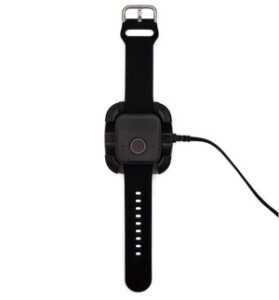
- Monthly cost: $44.95
- Activation fee: $0
- Equipment fee: $149.95 (one-time fee)
- Shipping fee: $12.50
- Dimensions: 1.5″ L x 1.4″ W x 0.5″ H (watch face)
- Weight: 0.7 oz
MGMini
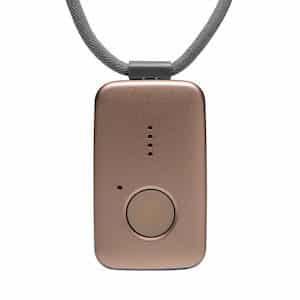
- Monthly cost: $39.95
- Activation fee: $0
- Equipment fee: $199.95 (one-time fee)
- Shipping fee: $12.50
- Dimensions: 2.1″ L x 1.3″ W x 1.7″ H
- Weight: 1.3 oz
Life Alert
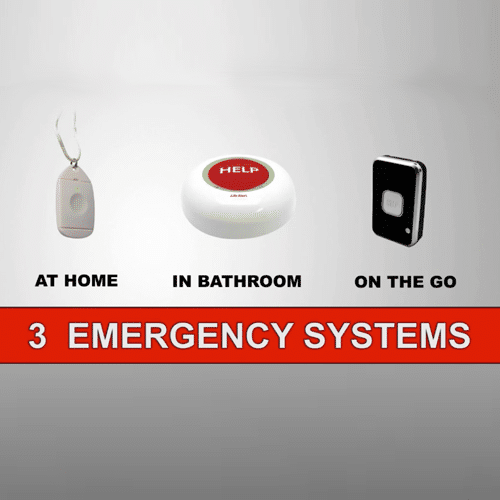
Pros
- Has its own emergency monitoring center and does not contract with outside call centers
- Devices use long-lasting lithium batteries (last up to 10 years)
- Monthly fees don’t increase over the term of the contract
- Been in business for more than 30 years
Cons
- Requires a three-year contract, which you can’t cancel unless the user passes away or family can prove the user is in a 24-hour nursing facility
- Automatic fall detection is not available
- No online transparency with pricing
- No promotional discounts
- Shorter device range (800 feet—about two football fields)
- Higher starting monthly cost ($50–$90)
You might be familiar with Life Alert’s memorable catchphrase, “Help! I’ve fallen and I can’t get up!” Thanks to this phrase, Life Alert is one of the best known medical alert companies in the U.S. It’s been around for more than 30 years and has very high name recognition.
One of the company’s biggest pros is its long battery life—Life Alert devices are more basic than Medical Guardian’s (they don’t have special features like location tracking or medication reminders), but they last much longer. Life Alert batteries can last up to 10 years, compared to a maximum of five days with Medical Guardian.
Life Alert’s website is cluttered, and the company doesn’t provide its prices online. Our Reviews Team had to contact the company through its toll-free number to answer a series of questions and provide a mailing address so Life Alert could send a brochure with details on plans and costs. After some back and forth over the phone, our team was able to gather pricing information for Life Alert’s three packages: its at-home system; at-home + help button; and at-home + help button + GPS system (this is Life Alert’s only on-the-go system).
Besides the lack of transparency, one of Life Alert’s biggest downsides is its contract—very few other medical alert companies require people to sign a contract, yet Life Alert requires a three-year contract. Users are only able to get out of the contract early if they die or if a family member can prove they’re receiving 24-hour nursing care. These lengthy and restrictive contractual terms are one of the main reasons our Reviews Team doesn’t recommend Life Alert.
Customer service and payment options
The customer service team at Life Alert is available by phone at 1-800-338-9090 Monday through Saturday from 6 a.m. to 7 p.m. PST.
Life Alert accepts payments in the form of check, credit card, or check by phone.
Please keep in mind that because it requires a three-year contract, the monthly costs listed below are breakdowns of the full cost.
Read more in our Life Alert review.
Life Alert: Popular Devices
At-home system
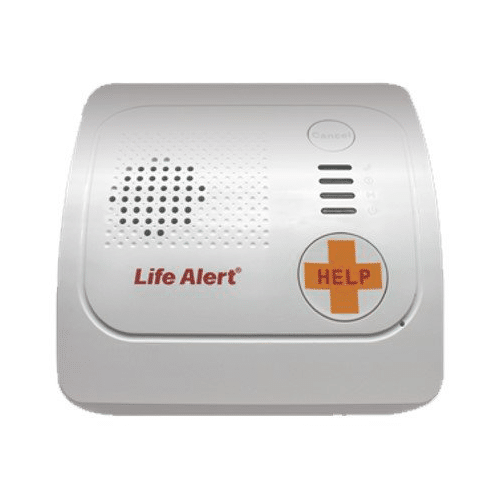
- Monthly cost: $49.95
- Activation fee: $96
- Equipment fee: $0
- Dimensions: 8.5 x 6.7 x 2 inches (length x width x height)
- Weight: 1.75 pounds
At-home + Help Button
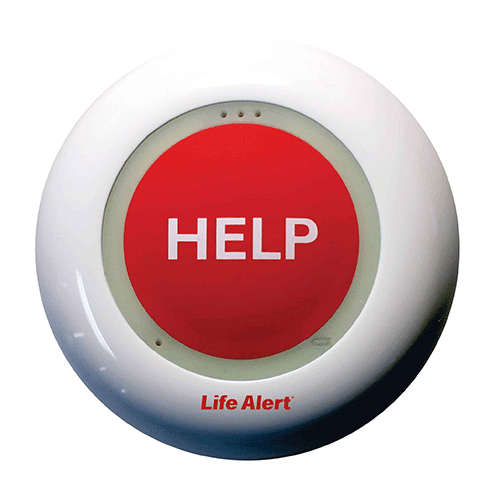
- Monthly cost: $70
- Activation fee: $96
- Equipment fee: $0
- Dimensions: 2.8” L x 1.75” W x .75” H
- Weight: 1 ounce
At-home + Help Button + GPS system
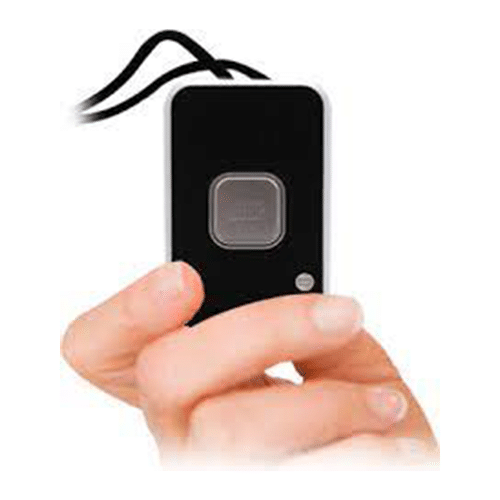
- Monthly cost: $90
- Activation fee: $198
- Equipment fee: $0
- Dimensions: 2.75” L x 1.75” W x 0.75” H
- Weight: 2 ounces
Table 1 Comparing Life Alert vs. Medical Guardian
| Starting monthly cost | $50–$90 | $30–$45 |
| Equipment cost | $0 | $0–$$199.95 |
| Activation fee | $96–$198 | $0 |
| Range | 800 feet | 1,400 feet |
| Battery life | 10 years | Up to 5 days |
| Fall detection option | No | Yes |
| Contract | Yes | No |
| Connection type | Cellular or landline | Cellular or landline |
| Water-resistant | Yes | Yes |
| GPS tracking option | Yes | Yes |
| Mobile app | Yes | Yes |
| Optional monthly add-ons | No | Yes |
| Special features | Industry-leading battery life of 10 years | Offers smartwatch option, location tracking, and medication reminders |
How do I choose the best medical alert system for me?
Choosing the best medical alert system starts with considering different features, such as at-home vs. on-the-go systems, monitoring assistance, battery life, and fall detection. With numerous medical alert systems and plans to choose from, it can be challenging to know which one is right for you.
Consider the following key features:
At-home vs. on-the-go systems
At-home systems include a base unit that connects to a monitoring center via landline or cellular service. Users wear a device around the neck or on the wrist, with a built-in button they press to activate the system. The Medical Guardian system has an at-home range of 1,400 feet, while Life Alert’s at-home system has a range of 800 feet.
On-the-go systems use cellular networks and GPS tracking (which rely on satellites to pinpoint your location) to connect users to monitoring center operators wherever they go, as long as they stay within range of the cellular service. With on-the-go systems, there’s no need for a base unit.
To learn more on medical alert monitoring centers, read about how medical alert systems work.
Monitoring assistance
One benefit of having a monitored medical alert system is the 24/7 monitoring, which both Life Alert and Medical Guardian offer. The Monitoring Association (TMA) has designated both companies as TMA Five Diamond certified, meaning they adhere to random inspections and quality control criteria.
Fall detection
Fall detection (also called automatic fall detection) uses sensors such as accelerometers, which detect motion, to identify when you fall and alert the medical alert company’s monitoring center that you need help. It’s a popular function—respondents to our Reviews Team’s survey chose it as the most desired special feature in a medical alert system.
Nearly every company includes a disclaimer on its website stating no device is 100% accurate, so many fall detection devices include a help button as well in case the device doesn’t record your fall.
Fall detection uses a wearable device (typically a necklace or bracelet) to detect when the wearer falls and automatically send help. Some medical alert smartwatches also have a fall detection option, but we feel the best way to wear a fall detection device is as a necklace high on your chest and on top of your sternum for accuracy. Research from 2021 [1]Javier González-Cañete, Francisco and Casilari, Eduardo. A Feasibility Study of the Use of Smartwatches in Wearable Fall Detection Systems. Sensors. March 23, 2021. Found on the internet at https://www.mdpi.com/1424-8220/21/6/2254. and 2023 [2]Lee, Yongkuk, et al. Experimental Study: Deep Learning-Based Fall Monitoring among Older Adults with Skin-Wearable Electronics. Sensors. March 2023. Found on the internet at https://www.mdpi.com/1424-8220/23/8/3983. shows fall detection worn around your neck is more accurate than fall detection worn around your wrist.
And according to the Centers for Disease Control and Prevention, around 36 million older adults fall every year. [3]Centers for Disease Control and Prevention, “Facts About Falls.” Found on the internet at https://www.cdc.gov/falls/about/index.html. Of those who fall, 3 million are injured seriously enough to need emergency care, and their chances of falling again are doubled. Fear of falling is actually one of the top causes of falling. In a study published by BMC Geriatrics in June 2021, researchers noted “fear of falling and previous falls are both risk factors that affect daily activities.” [4]Davidson, et al. Fear of Falling is as Important as Multiple Previous Falls in Terms of Limiting Daily Activities: a Longitudinal Study. Found on the internet at https://bmcgeriatr.biomedcentral.com/articles/10.1186/s12877-021-02305-8. Fear of falling leads many older adults to limit physical activities like cleaning their home, going outside, and even eating. In turn, limiting those activities can then increase fall risk.
Fall detection can alert emergency operators more quickly, save precious time, and give users peace of mind. Medical Guardian offers fall detection technology, while Life Alert does not.
To understand your risk of falling as well as gain tips on how to prevent falls, use NCOA’s Falls Free CheckUp tool.
Battery life
In a power outage, both Life Alert and Medical Guardian have at-home base units with backup batteries. You don’t need to charge Life Alert’s on-the-go necklaces (which can last up to 10 years), while you’ll need to recharge Medical Guardian’s batteries every one to five days, depending on the device.
Having a longer battery life may be helpful for those who routinely forget to charge devices or have memory impairment.
Life Alert vs Medical Guardian: Bottom Line
Although Life Alert is a well-known company, our Reviews Team doesn’t recommend Life Alert’s medical alert systems due to the company’s restrictive contracts and reluctance to provide transparent pricing. More than 25% of Life Alert users surveyed by our Reviews Team reported their contract was misleading.
Our Reviews Team chose Medical Guardian as the better option because you can easily find its pricing structure on its website, there is no long-term contract requirement, its plans can be canceled any time, its prices are lower, and its devices come with more options and special features.
Frequently Asked Questions
When looking at Life Alert vs. Medical Guardian reviews, Medical Guardian is a better choice than Life Alert because it costs less and doesn’t require users to sign long-term, difficult-to-cancel contracts.
The biggest differences between Life Alert and Medical Guardian are their contract requirements and fall-detection capabilities.
Life Alert requires users to sign a three-year contract, which you can only terminate if the user dies or a family member shows proof the user is receiving 24-hour nursing care.
You can cancel Medical Guardian subscriptions at any time, and it will refund any unused fees.
If fall detection is an important consideration for you, Medical Guardian offers this as an optional feature for an additional $10 per month, while Life Alert does not.
While Life Alert is TMA Five Diamond certified by The Monitoring Association, meaning it agrees to random inspections and rigorous quality control standards, our Reviews Team doesn’t recommend Life Alert due to the company’s inability to provide transparency on their pricing, and their strict contractual practices. Medical Guardian is also TMA Five Diamond certified by The Monitoring Association.
Have questions about this review? Email us at reviewsteam@ncoa.org.
Sources
- Javier González-Cañete, Francisco and Casilari, Eduardo. A Feasibility Study of the Use of Smartwatches in Wearable Fall Detection Systems. Sensors. March 23, 2021. Found on the internet at https://www.mdpi.com/1424-8220/21/6/2254.
- Lee, Yongkuk, et al. Experimental Study: Deep Learning-Based Fall Monitoring among Older Adults with Skin-Wearable Electronics. Sensors. March 2023. Found on the internet at https://www.mdpi.com/1424-8220/23/8/3983.
- Centers for Disease Control and Prevention, “Facts About Falls.” Found on the internet at https://www.cdc.gov/falls/about/index.html.
- Davidson, et al. Fear of Falling is as Important as Multiple Previous Falls in Terms of Limiting Daily Activities: a Longitudinal Study. Found on the internet at https://bmcgeriatr.biomedcentral.com/articles/10.1186/s12877-021-02305-8.



